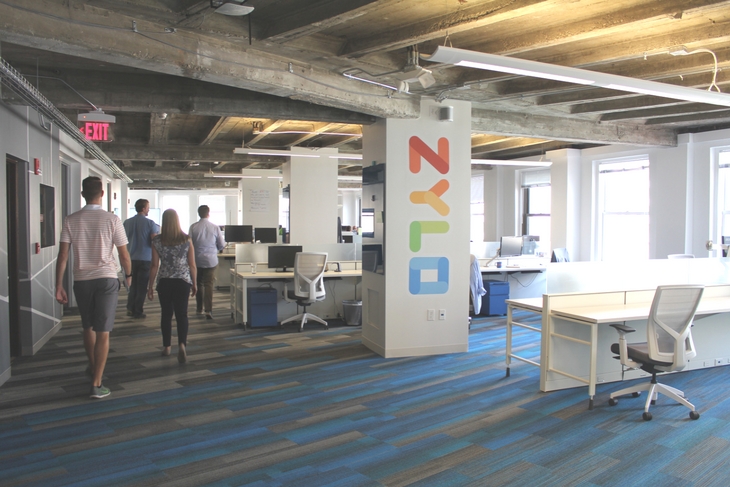Zylo poised for fast, significant growth as industry outlier
Zylo launched as a High Alpha venture studio company a little over a year ago, built its unique software product through the summer, and won its first few customers in the fall 2016. The company’s first-year history reads like a prototypical startup success story on the surface, but some key entrepreneurial differences have set Zylo up for fast and significant growth.
An outlier with few head-to-head competitors, Zylo enables companies to discover, manage, measure and optimize their cloud investments across the enterprise. Zylo’s platform is a single pane of glass for management and other decision-makers — especially budget controllers — to view what they are spending on software-as-a-service subscriptions, how often those applications are being used (or not being used), when contract negotiations and renewals are coming up, and what employees do and don’t like about the SaaS resources.
Since securing $3.3 million in seed funding in October, Zylo has quadrupled in size to employ 22 people. The investment round was led by Indianapolis-based High Alpha Capital and two San Francisco Bay Area venture capital firms — GGV Capital, and SV Angel. The two Bay Area VC firms were and will continue to be an important part of Zylo’s go-to-market and company growth strategies, which Co-founder and CEO Eric Christopher explained has already made a big difference for the company’s speed to market. More detail on these strategies is included later in the profile.
It’s worth noting that several SaaS industry leaders have also invested in Zylo including Interactive Intelligence (now Genesys) founder and CEO Don Brown, ExactTarget (now Salesforce) co-founder Peter McCormick and former Baker Hill (now Baker Hill NextGen) co-founder and President Mark Hill.
Bay Area Strength from a Midwestern Stronghold
For obvious reasons, Zylo’s success as a company and with its own software platform relies on close relationships with other SaaS companies. Since the San Francisco Bay area has one of the world’s greatest concentrations of SaaS companies, Zylo made building a strong Bay Area network a priority from day one, in addition to building several important customer relationships close to home.

Eric ChristopherCEO, Zylo
Interestingly, Zylo’s Bay Area go-to-market and growth strategy has helped the company avoid some pitfalls and accelerate its sales and marketing operations. “Most startups start out by selling to their local friends and acquaintances, people willing to take a shot and work with you because they want to see you succeed, which can lead to a lot of false positives,” Christopher said.
“I’ve learned that you want to get a lot of tough no responses early on and discover what the market is really going to be like. One of the best ways to do that is to sell outside of your market like we did and it’s really shaped where we are as a company and improved our product. The speed to market for us was dramatically reduced because we got those tough no’s, zeroed in on the best working sales and marketing strategies, and really made the most of those investments.”
A Good Friend to the SaaS Industry
At first blush, you might think Zylo is a problem for SaaS sales. And while the “optimization” aspect of its platform certainly could mean termination for redundancies or unused subscriptions, Christopher says the transparency Zylo brings to the table is much more likely to result in re-assigned seats, access for new hires, and ultimately, better and stronger relationships for SaaS vendors and their customers.
“More often than not, we’re competing with internal spreadsheets or legacy systems that have never offered anywhere near the level of visibility Zylo does into what has become a top five, or in some cases a top three expenditure for enterprises,” Christopher said. “The spending, utilization, employee feedback and other analysis we provide actually builds the value case for SaaS vendors whereas in the absence of Zylo, CIOs and department heads really have to struggle to support the large budget line-items that SaaS has become in virtually every company in every industry.”

Overcoming SaaS Management Pain Points
Marketed as the “SaaS Optimization Platform,” Zylo offers IT and procurement pros the ability to finally own their company’s entire cloud function, which has been a challenge due to the relative ease of purchasing and implementing SaaS. Zylo addresses three key pain points that are common among enterprises regardless of industry — transparency into the SaaS spend, utilization across the enterprise, and feedback from employees on the value they place on the products.
- Spend — Gain visibility into hidden employee expenditures, and manage complex contract renewals.
- Utilization — Understand the utilization of your SaaS subscriptions across the entire organization.
- Feedback — Capture sentiment and insights into how your employees are leveraging software.
According to Christopher, transparency into the spend pain point is a pretty obvious need, especially since companies pretty routinely underestimate the number of applications and cost of their current SaaS spend. He said prospects will often estimate that they have 100-150 applications under license at a preliminary meeting and later discover that it’s closer to 300-400. That means that half of the applications potentially with multiple users aren’t being managed (at least not centrally or under consistent guidelines) and renewals aren’t being proactively negotiated.
On the finance and procurement side, Zylo provides access to data that has been virtually hidden within different departments. By allowing finance and procurement to get a handle on everything from contract management to renewal negotiations, Zylo can help improve interdepartmental relations and external vendor relationships.
On the IT side, Zylo is a game-changer for forecasting by letting IT managers know what applications need to be supported. Imagine the headaches and unaccounted for staff time necessary to support teams requesting things like integrations for applications IT possibly didn’t even know were in use throughout the enterprise. Zylo also offers IT critical data to justify their budget and staffing resources to the rest of the organization through visibility and an understanding of what SaaS the company owns and how and where it’s being used.
Poised for Fast, Significant Growth
With over $300 million of SaaS spend already under management with Zylo, the addressable market for this unique platform is huge, and Zylo is targeting the world’s largest enterprises for customer acquisition. Any large company in any industry vertical that’s taking migration to SaaS and the cloud very seriously is a company Zylo wants to talk to. Cloud-based companies with 1,000+ employees are also Zylo targets — high-growth companies buying virtually 100 percent of their IT spend via SaaS.
“We don’t shy away from smaller customers, but large public companies or private companies that actually have enough scale to be public are the best fit,” Christopher said.
Zylo is currently hiring with open positions posted on the TechPoint Job Board. The company is particularly interested in building a diverse workforce and women and minorities are encouraged to apply.
Check out more stories about and by Zylo employees, including Eric Christopher’s piece: From salesman to CEO: my journey in enterprise SaaS.
Plus, don’t miss these profiles:
How product managers are evolving without a traditional career path
Data scientist Mark Clerkin’s journey, gamble and dream
Design brought Rohit Jesudian from Dubai and Mumbai to Indy


